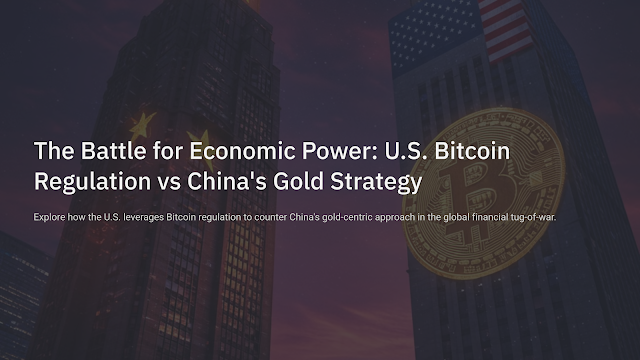The Battle for Economic Power: How U.S. Bitcoin Regulation Counters China’s Gold Strategy
Introduction: The Global Financial Tug-of-War
In the ongoing race for economic dominance, both the United States and China are leveraging unique strategies to strengthen their financial systems and global influence. While China has turned to gold as its cornerstone, the U.S. has identified Bitcoin as a potential counter-strategy. This blog unpacks how these strategies intertwine, why Bitcoin regulation matters, and how this approach could bolster the U.S. dollar in the face of China’s gold-centric financial game.
China’s Gold Strategy: A Shield Against Dollar Dependence
Why China is Hoarding Gold
China's reliance on gold stems from its desire to reduce dependence on the U.S. dollar. As the world’s reserve currency, the dollar gives the U.S. significant global financial leverage. By amassing gold reserves, China hopes to:
- Stabilize its economy against dollar fluctuations.
- Position gold as a reserve asset to hedge against the dollar’s dominance.
The Bitcoin Connection
Historically, Chinese citizens played a significant role in Bitcoin’s rise. Before China’s Bitcoin ban in 2021, the country controlled over 70% of global Bitcoin mining. However, the unregulated nature of Bitcoin allowed individuals to bypass China’s strict capital controls, moving wealth abroad. This massive outflow of capital undermined China’s efforts to retain domestic money and spurred the government’s crackdown on cryptocurrencies.
Illegal Bitcoin Flows
Even after the ban, Bitcoin remains a tool for illicit money movement. Wealth continues to flow out of China via decentralized cryptocurrencies, bypassing traditional financial oversight. This leakage poses a challenge for China’s financial stability and its control over domestic wealth.
The U.S. Response: Regulating Bitcoin to Counter China
Why Bitcoin Regulation Matters to the U.S.
The U.S. sees an opportunity in Bitcoin’s decentralized nature to:
- Leverage Chinese Wealth: With Chinese citizens funneling money through Bitcoin, regulation ensures that these flows benefit the U.S. economy. A robust crypto framework could attract global capital, particularly from China.
- Bolster the Dollar: By integrating Bitcoin into its financial system, the U.S. can strengthen the dollar’s position as the world’s dominant currency.
- Mitigate Currency Fluctuations: A regulated Bitcoin market can offset the impact of China’s gold-driven currency strategy, stabilizing the dollar against global economic shifts.
The Strategy in Action
President Trump’s recent executive order, "Strengthening American Leadership in Digital Financial Technology," underscores the importance of this approach. Key initiatives include:
- Regulatory Framework: Clear rules for cryptocurrency trading to attract institutional and global investors.
- National Digital Asset Stockpile: A reserve of lawfully acquired cryptocurrencies to hedge against inflation and economic uncertainties.
- Consumer Protection and Innovation: Striking a balance between fostering innovation and preventing illicit activities.
Why Bitcoin is the U.S.’s Leverage Point
Bitcoin represents a dynamic counterweight to China’s gold strategy:
- Digital Gold vs. Physical Gold: Unlike gold, Bitcoin is easier to transfer, store, and integrate into modern financial systems. Its decentralized nature attracts global investment, creating demand for the dollar as the dominant trading currency.
- Capital Flow Advantage: The ongoing movement of Chinese wealth through Bitcoin creates a unique opportunity for the U.S. to attract and utilize this capital, strengthening its economy and currency.
- Future-Proofing Finance: By regulating Bitcoin, the U.S. positions itself as a leader in the digital financial revolution, ensuring its dominance in a rapidly evolving global economy.
Historical Context: Lessons from Financial Power Shifts
The U.S.’s strategy reflects historical trends in leveraging assets to maintain economic dominance:
- The Gold Standard Era: Gold was once the foundation of global trade. Nations with significant gold reserves wielded immense economic power.
- Bretton Woods and the Dollar: Post-World War II, the U.S. established the dollar as the global reserve currency, backed by gold. When the system ended in 1971, the U.S. shifted to a fiat currency system.
- Bitcoin’s Role in Modern Finance: Bitcoin offers a new layer of economic influence, akin to digital gold but with added flexibility and scalability.
Implications for the Future: What This Means for Global Finance
For the U.S. Economy
- Dollar Strengthening: Regulating Bitcoin could bring significant global wealth into the U.S., reinforcing the dollar’s position.
- Economic Stability: A regulated crypto market acts as a hedge against inflation and future economic uncertainties.
- Technological Leadership: The U.S. cements its role as a leader in blockchain and digital asset innovation.
For China’s Strategy
China’s heavy reliance on gold and its ban on Bitcoin create vulnerabilities:
- Capital Outflows: Bitcoin continues to undermine China’s capital controls, funneling wealth abroad.
- Reduced Dollar Leverage: Gold may hedge against the dollar, but it lacks the dynamism and global accessibility of cryptocurrencies.
Final Thoughts: A Calculated Move in a Financial Chess Game
The U.S.’s push to regulate Bitcoin is a strategic response to China’s gold-centric strategy and its attempts to shield its economy from dollar dominance. By controlling Bitcoin, the U.S. gains a leverage point to attract global wealth, stabilize its currency, and maintain its leadership in the global financial system.
In this chess game of economics, Bitcoin is more than just a digital currency—it’s a strategic tool to counteract gold, leverage global money flows, and ensure the dollar’s enduring power. As the U.S. and China continue to play their respective hands, the world watches as the future of finance unfolds.



